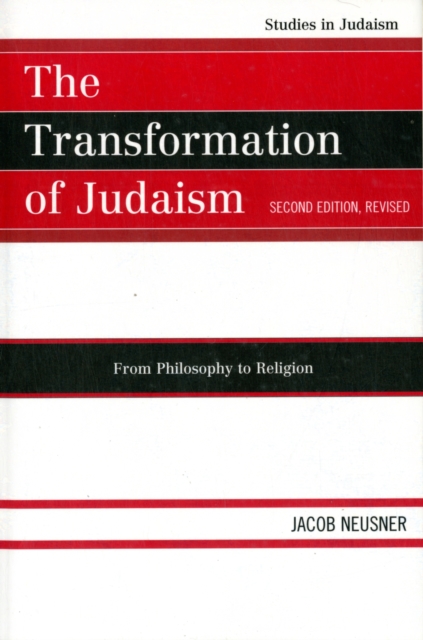
The Transformation of Judaism : From Philosophy to Religion Paperback / softback
by Jacob Neusner
Part of the Studies in Judaism series
Paperback / softback
Description
Jacob Neusner describes, analyzes, and interprets the transformation of one system of the Israelite social order by a connected but autonomous successor-system.
He characterizes the successive systems classifying the one as philosophical and the other as religious.
He explains the categorical account of each and sets forth the outcome of a number of topical studies on the category-formations of Rabbinic Judaism with special attention to the social order: politics, philosophy, and economics.
These systems emerged as [1] autonomous when viewed synchronically, [2] connected when seen diachronically, and [3] as a continuous construction when seen at the end of their formative age.
In their successive stages of categorical autonomy, connection, and finally continuity, the three distinct systems may be classified, respectively, as philosophical, religious, and theological, each one taking over and revising the definitive categories of the former and framing its own fresh, generative categories as well.
The formative history of Judaism is the story of the presentations and re-presentations of categorical structures.
In method, it is the exegesis of taxonomy and taxic systems. Now, after more than two decades, Neusner has decided to review the initial statement.
Since the book summarizes ten years of work, from 1980 to 1990, on the Rabbinic category formations of social science politics, philosophy, and economics in the setting of the law and theology of Rabbinic Judaism from the Mishnah through the Bavli, 200-600 C.E., it seemed well worth the effort to recapitulate the original work.
The revised introduction explains the omission of theology in his category-formation philosophy-religion-theology; Neusner's account of the Bavli produced the decade after this title was completed did not make possible the continuous description of the unfolding of the Rabbinic system.
The pattern that appealed to Neusner from philosophy to religion to theology has not yet come to a satisfactory account.
In the twenty years
Information
-
Available to Order - This title is available to order, with delivery expected within 2 weeks
- Format:Paperback / softback
- Pages:316 pages
- Publisher:University Press of America
- Publication Date:31/03/2011
- Category:
- ISBN:9780761854395
Other Formats
- Hardback from £61.65
Information
-
Available to Order - This title is available to order, with delivery expected within 2 weeks
- Format:Paperback / softback
- Pages:316 pages
- Publisher:University Press of America
- Publication Date:31/03/2011
- Category:
- ISBN:9780761854395










